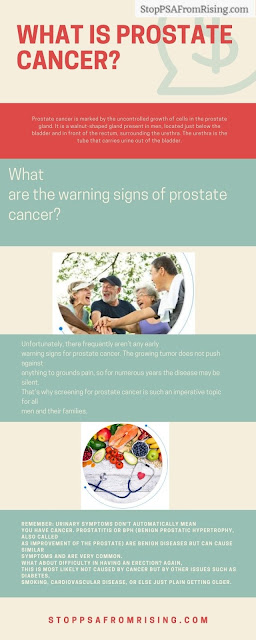Must-know Symptoms associated with prostate cancer
Growing Levels of PSA aren’t a good indicator of
prostate health; instead, your doctor will seem at your PSA levels beside other
risk factors, like age, digital rectal exam results, as well as family history.
In the USA, one out of every nine men will be
diagnosed with prostate cancer in his lifetime.
If you’ve recently been analyzed with prostate
cancer, you may be asking yourself if there were warning signs or symptoms you
should have noticed earlier.
Symptoms
of prostate cancer
Unfortunately, there frequently aren’t any early
warning signs for prostate cancer. The growing tumor does not push against
anything to grounds pain, so for numerous years the disease may be silent.
That’s why screening for prostate cancer is such an imperative topic for all
men and their families.
In rare cases, prostate cancer can cause symptoms. Get
in touch with your doctor for an valuation if you experience any of the
following:
·
Urge to urinate frequently, especially
at night, some- times urgently
·
Difficulty starting or holding back
urination
·
Weak, dribbling, or interrupted flow of
urine
·
Painful or burning urination
·
Difficulty in having an erection
·
A reduce in the amount of fluid
expostulated
·
Painful ejaculation
·
Blood in the urine or semen
·
Pressure or pain in the rectum
·
Pain or stiffness in the lower back,
hips, pelvis, or thighs
How
PSA Protocol Formula is different from conventional method of treatment?
The conventional prostate cancer treatment focuses
on destroying the cancerous cells, but in doing so it fails to address the
underlying anabolic imbalances that set the stage for the development of the
cancerous circumstances in the first place. Whereas, the PSA Protocol Formula
way is different; it is a non-toxic natural way that help alleviate symptoms
associated with Prostatitis, BPH, elevating PSA at all stages of prostate
cancer in short time, naturally endorsing healthy prostate gland, bladder and
kidney functions.


Comments
Post a Comment